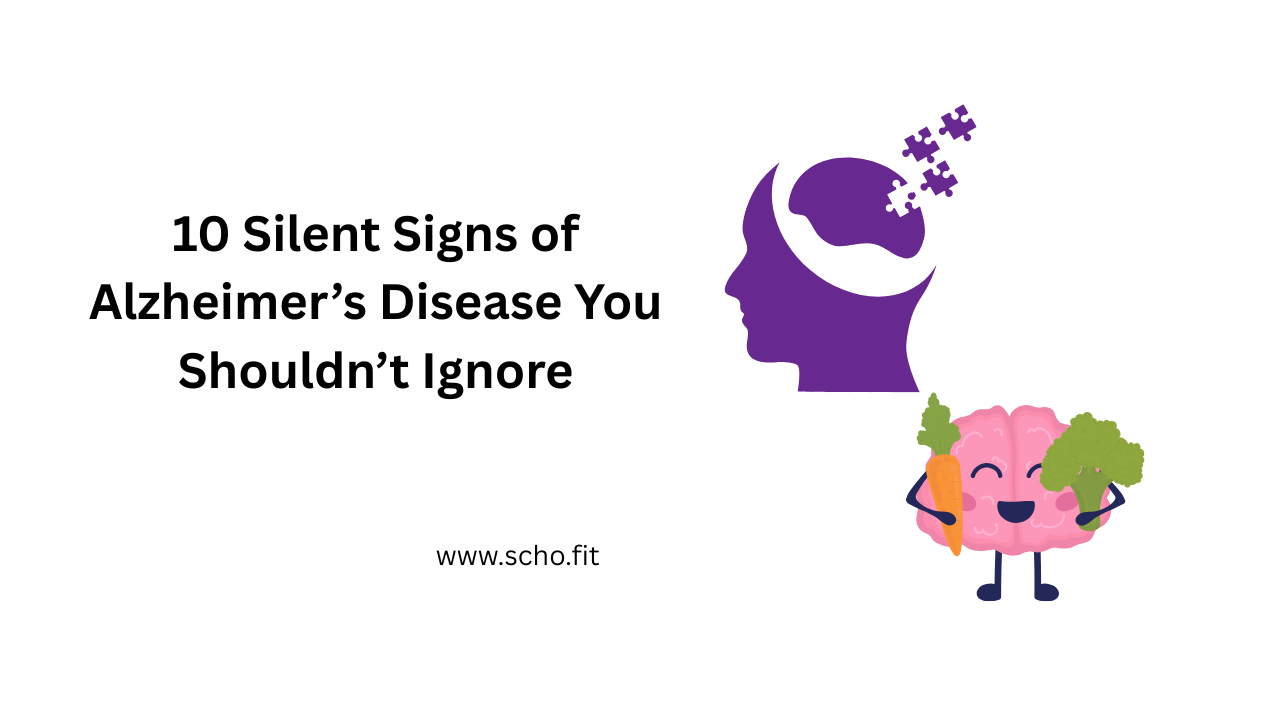
Subtle Early Signs of Alzheimer's Disease
May 21, 202510 Silent Signs of Alzheimer’s Disease You Shouldn’t Ignore
By: Marcy Schoenborn
Alzheimer’s disease is often thought of as a condition that suddenly steals memories and changes personalities—but in reality, it begins silently, creeping in with subtle shifts long before a formal diagnosis is made.
Here’s a deep dive into the silent or overlooked early signs of Alzheimer’s, based on current research, clinical practice, and public health data.
🧠 What Is Alzheimer’s Disease?
Alzheimer’s is a progressive neurodegenerative disorder that primarily affects memory, thinking, and behavior. It's the most common form of dementia, affecting over 6 million Americans today—and that number is rising rapidly as the population ages.
While memory loss is often the most recognized symptom, many early warning signs are non-obvious, often mistaken for normal aging, stress, or even mood changes.
Proper nutrition is one of the most powerful tools we have for protecting the brain and reducing the risk of Alzheimer’s disease. The Scho Fit approach emphasizes whole, nutrient-dense foods that support brain function, reduce inflammation, and stabilize blood sugar—key factors in long-term cognitive health. By focusing on vibrant vegetables, healthy fats like omega-3s from flaxseeds and walnuts, high-quality proteins, and low-glycemic, fiber-rich carbohydrates, Scho Fit helps create an internal environment where the brain can thrive. Avoiding processed foods, added sugars, and inflammatory oils also minimizes oxidative stress, which is closely linked to neurodegenerative decline. When consistently applied, this way of eating not only supports physical health and weight management, but also strengthens memory, focus, and mental clarity—making it a vital part of Alzheimer’s prevention.
Consuming a nutritious brain fueling diet has been shown to lower Alzheimer’s risk by up to 53% in strict adherents, according to research published in Alzheimer’s & Dementia (Morris et al., 2015). Limiting saturated fats, refined sugars, and ultra-processed foods can also reduce insulin resistance and vascular damage, which contribute to cognitive impairment. Including foods like leafy greens, berries, nuts, legumes, and olive oil in daily meals offers a powerful, natural way to nourish the brain and potentially delay the onset of Alzheimer’s symptoms.
🔍 10 Silent Signs of Alzheimer’s Disease
1. Short-Term Memory Loss
We all forget things now and then. But people in the early stages of Alzheimer’s often forget recent conversations, misplace items, or ask the same questions repeatedly—without realizing it.
Reference: Alzheimer’s Association
2. Difficulty Planning or Solving Problems
Tasks like following a familiar recipe or managing monthly bills can become overwhelming. You might notice more mistakes in tasks that require concentration or step-by-step thinking.
Reference: CDC Alzheimer’s Warning Signs
3. Struggling with Familiar Tasks
Activities that used to be second nature—driving to a familiar location, playing a favorite game—may suddenly feel confusing or impossible.
Reference: Rush University Medical Center
4. Disorientation in Time or Place
People may lose track of dates, forget where they are, or wonder how they got somewhere. They may also confuse seasons or forget the current year.
Reference: CDC
5. Vision and Spatial Issues
Reading, judging distance, and distinguishing contrast can become challenging. These changes can impact depth perception and navigation, making driving or walking in unfamiliar areas dangerous.
Reference: Rush University
6. Trouble with Words in Speaking or Writing
Individuals might struggle to find the right words, repeat themselves, or stop mid-sentence. They may call objects by the wrong name or avoid conversations altogether.
Reference: Alzheimer’s Association
7. Misplacing Items and Losing the Ability to Retrace Steps
This isn’t just misplacing your keys once in a while. It’s putting things in odd places—like your phone in the fridge—and then being unable to figure out how it got there.
Reference: CDC
8. Poor Judgment or Decision-Making
Sudden changes in financial decisions, lack of personal hygiene, or falling for scams are often overlooked early warning signs of cognitive decline.
Reference: Alzheimer’s Association
9. Withdrawal from Work or Social Activities
Hobbies and social events that once brought joy may suddenly feel overwhelming or uninteresting. This withdrawal may be explained away as fatigue or depression.
Reference: CDC
10. Mood and Personality Changes
Early Alzheimer’s can cause increased anxiety, confusion, suspicion, or irritability. A typically calm person may become aggressive or paranoid, especially in unfamiliar environments.
Reference: Claxton-Hepburn Medical Center
🧪 Emerging Diagnostic Tools
Several new approaches are making early diagnosis more accurate and accessible:
- Clock Drawing Test & Semantic Fluency Tasks: Simple cognitive screens that detect subtle impairments in memory, planning, and word retrieval.
- AI and Machine Learning: Advanced algorithms are now being developed to identify early Alzheimer’s by analyzing behavior patterns and speech.
- FDA-Approved Blood Tests: New blood tests can detect amyloid beta buildup, a hallmark of Alzheimer’s, long before symptoms appear.
References: AP News, Herald Sun
🧭 Why Early Detection Matters
Early identification of these subtle symptoms allows:
- Access to emerging treatments and clinical trials
- Better long-term care planning
- Strategies to slow progression through lifestyle, cognitive therapy, and medications
It’s not about fear—it’s about empowerment through knowledge and action.
🗣️ Final Thoughts
Alzheimer’s disease does not announce itself loudly at first. Its early signs are often subtle whispers, not screams. Recognizing these quiet changes in yourself or a loved one can open the door to timely intervention and better quality of life.
If you notice any of these signs, don’t wait—speak with a healthcare professional and request a full cognitive assessment.
Don't miss a beat!
New moves, motivation, and classes delivered to your inbox.
We hate SPAM. We will never sell your information, for any reason.
